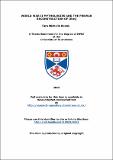Files in this item
World War II mythologies and the prewar reconstruction of Iraq
Item metadata
| dc.contributor.advisor | Williams, Andrew J. | |
| dc.contributor.author | Beeny, Tara Michelle | |
| dc.coverage.spatial | 125 | en_US |
| dc.date.accessioned | 2015-04-30T12:24:49Z | |
| dc.date.available | 2015-04-30T12:24:49Z | |
| dc.date.issued | 2015-06-23 | |
| dc.identifier.uri | https://hdl.handle.net/10023/6602 | |
| dc.description.abstract | This dissertation interrogates the positionality of postconflict reconstruction efforts in Iraq within the broader discourse of the liberal peace and liberal reconstruction. It examines how U.S. policymakers planned and articulated the reconstruction of Iraq in relationship to historical examples, specifically the cases of West Germany and Japan. It questions how U.S. policymakers understood and utilized the examples of post-World War II reconstruction and the effect those examples had on the policymaking process. This dissertation traces the role historical memory plays in the formation and articulation of foreign policy by examining the use of historical analogies in planning the political, economic, and civil reconstruction of Iraq. It finds that the largest factor contributing to miscalculation in the invasion and occupation of Iraq was not conservative hawkishness, or liberal ineffectiveness, but rather a common mythology shared by many members of the U.S. foreign policy community, including the Bush administration, the Department of State, the Department of Defense, the Central Intelligence Agency, and the most prominent Washington think tanks. This common mythology asserts that U.S. and Allied postwar reconstruction efforts in West Germany and Japan were unequivocal successes that led directly to the liberal democracies and neoliberal economies found today in Germany and Japan. This conventional wisdom shapes which policies appeared viable to U.S. policymakers, and resulted in undeserved optimism during the postwar planning for Iraq. This dissertation concludes that the lessons of postconflict reconstruction in Iraq remain contested. Lacklustre results in Iraq have not caused U.S. policymakers to re-evaluate their understanding of the U.S. role in postconflict reconstruction. Rather, the case of Iraq is being absorbed into the existing conventional wisdom, with believers in postconflict reconstruction claiming Iraq was simply planned poorly, or was not met with the kind of resources and commitment that could have led to success. | en_US |
| dc.language.iso | en | en_US |
| dc.publisher | University of St Andrews | |
| dc.subject | Postwar reconstruction | en_US |
| dc.subject | Iraq | en_US |
| dc.subject | Liberal peace | en_US |
| dc.subject | Liberal reconstruction | en_US |
| dc.subject.lcc | DS79.769B4 | |
| dc.subject.lcsh | Postwar reconstruction | en_US |
| dc.subject.lcsh | Iraq | en_US |
| dc.subject.lcsh | United States--Relations--Iraq | en_US |
| dc.title | World War II mythologies and the prewar reconstruction of Iraq | en_US |
| dc.type | Thesis | en_US |
| dc.type.qualificationlevel | Doctoral | en_US |
| dc.type.qualificationname | MPhil Master of Philosophy | en_US |
| dc.publisher.institution | The University of St Andrews | en_US |
| dc.publisher.department | School of International Relations | en_US |
This item appears in the following Collection(s)
Items in the St Andrews Research Repository are protected by copyright, with all rights reserved, unless otherwise indicated.

